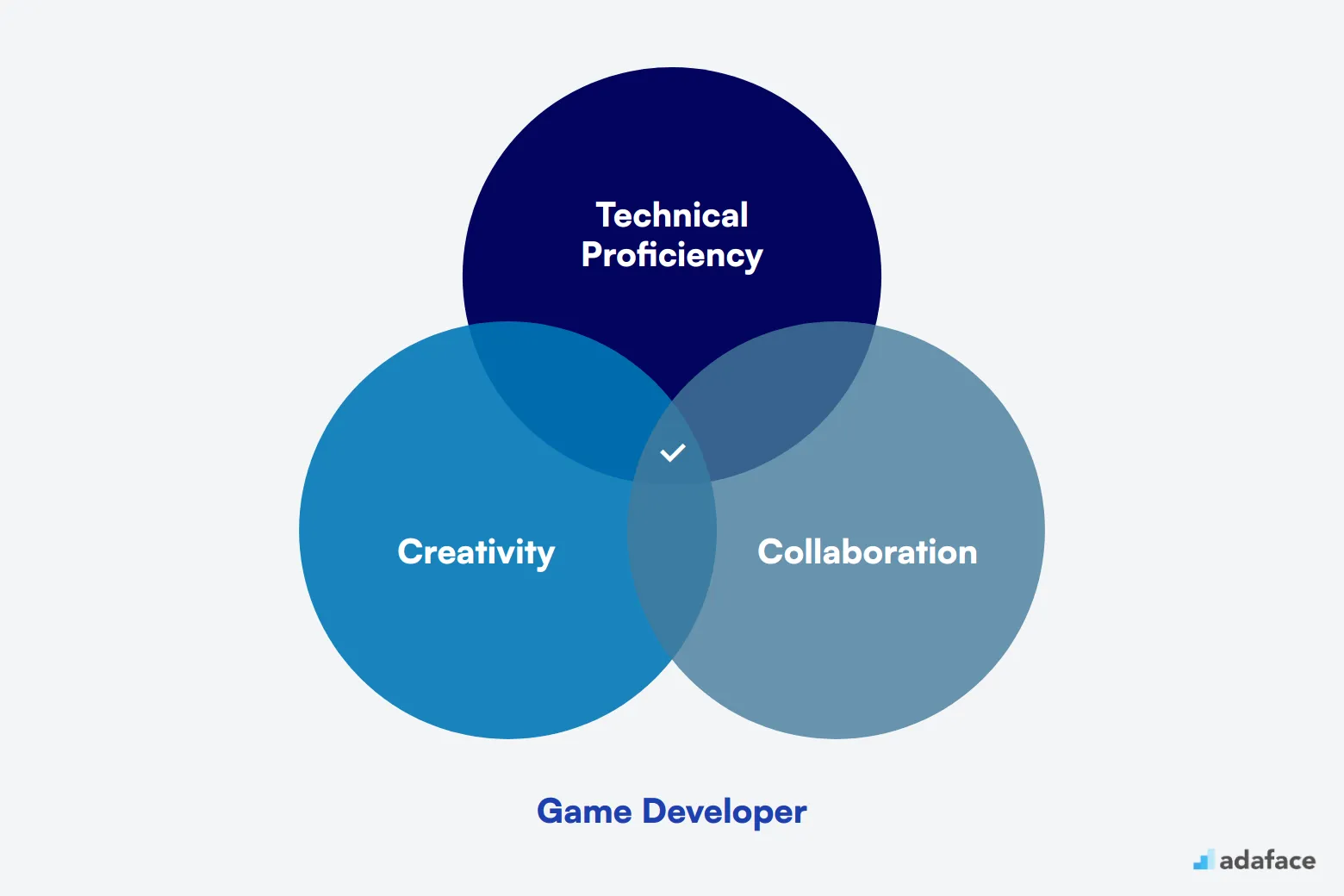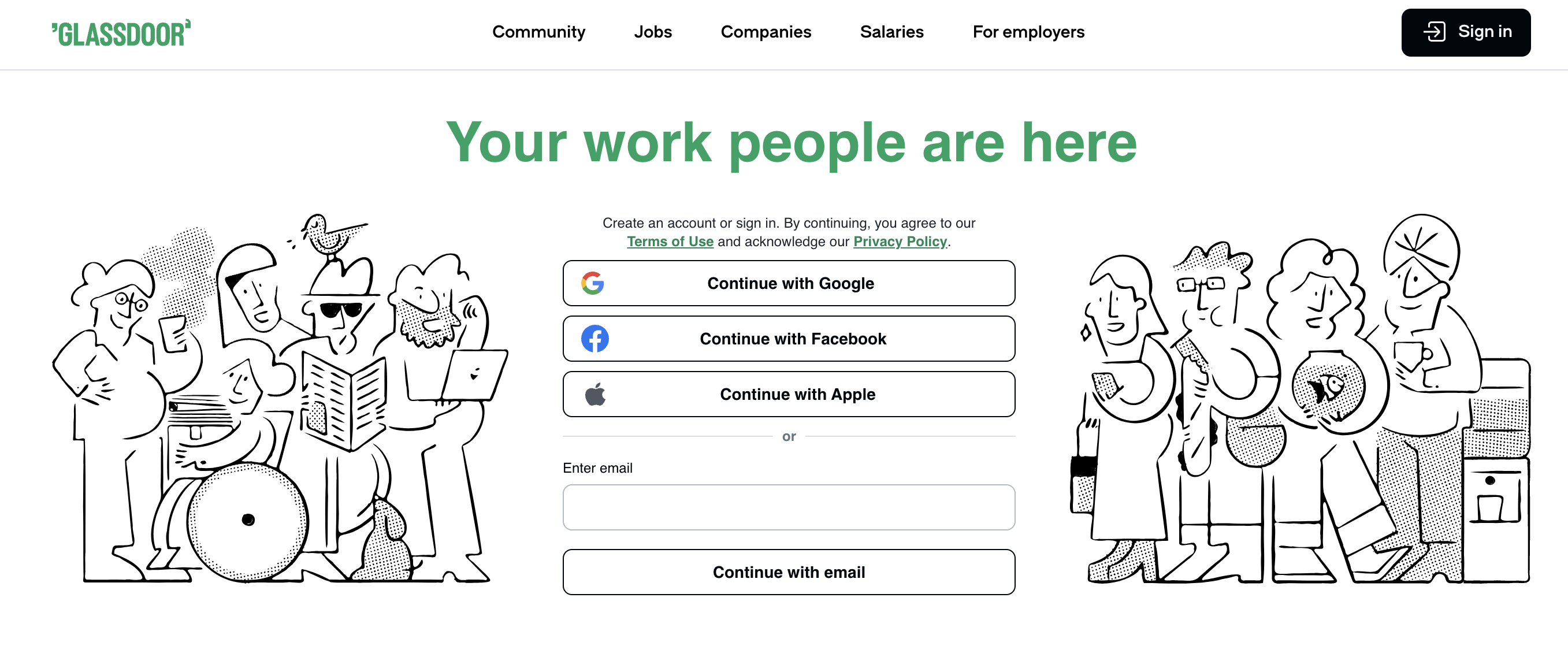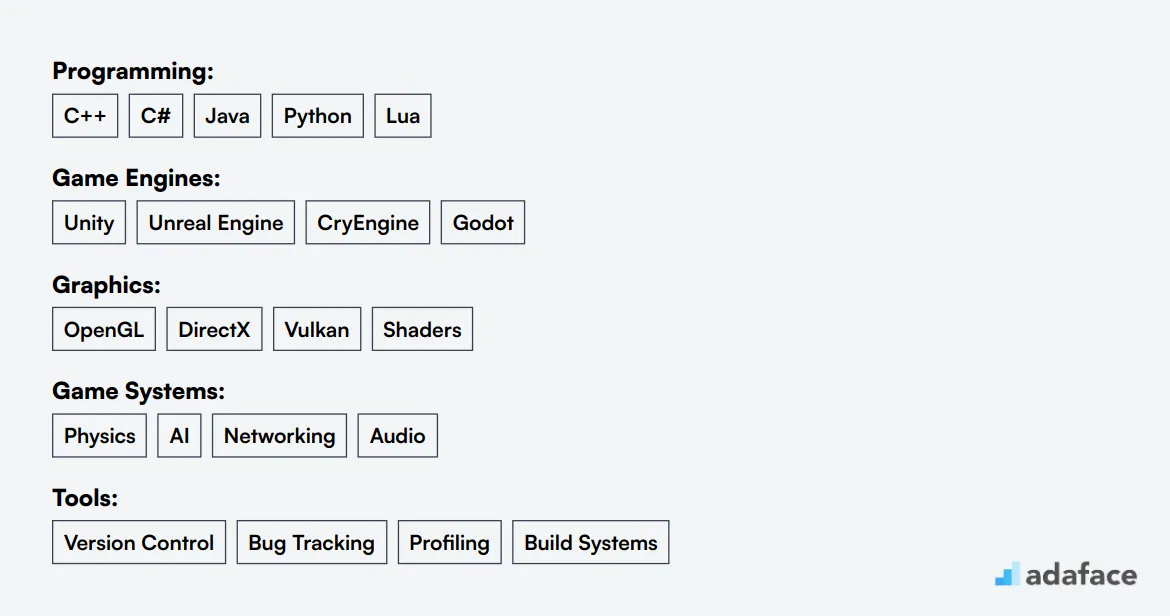Recruiting game developers is a unique challenge in the tech industry. Many companies struggle to find candidates with the right blend of technical skills, creativity, and passion for gaming. The key is to understand the specific requirements of game development and tailor your hiring process accordingly.
This comprehensive guide will walk you through the process of hiring top-notch game developers, from crafting an effective job description to conducting insightful interviews. We'll also explore skills assessment tools that can help you evaluate candidates objectively and efficiently.
Table of contents
Why Hire a Game Developer?
Hiring a game developer can help your company tap into the booming gaming industry. They bring specialized skills to create engaging, interactive experiences that can attract new audiences or enhance existing products.
Consider hiring a game developer if you're facing challenges like:
- Needing to gamify your app or website to increase user engagement
- Wanting to create a branded game for marketing purposes
- Developing a serious game for training or education
Before committing to a full-time hire, assess your long-term gaming needs. For short-term projects, you might start with a freelance game developer to test the waters. If gaming becomes a core part of your strategy, bringing on a full-time developer can provide consistent, dedicated expertise.

What do Game Developers do?
Game Developers are the creative minds behind video games. They work on creating the game's concept, designing the graphics, writing code, and ensuring everything runs smoothly to deliver an engaging user experience.
In their daily work, Game Developers may:
- Collaborate with designers to create and refine game concepts.
- Write and debug code to implement game mechanics.
- Design and optimize graphics for visual appeal.
- Test games to identify bugs and improve performance.
- Coordinate with other team members, like artists and sound engineers, to combine various elements into a cohesive game.
For more insights into the skills required, you might want to explore our skills required for game developer guide.
Game Developer Hiring Process
The hiring process for a game developer typically spans around 6-8 weeks. Understanding the steps involved can streamline your recruitment efforts.
- Craft a tailored job description: Start by clearly defining the skills and responsibilities required for the role. Post this on relevant platforms to attract suitable candidates.
- Resume collection: Expect to receive applications within the first week after posting the job. This gives you a good pool of candidates to consider.
- Shortlisting candidates: After reviewing resumes, shortlist candidates based on their experience and skills. This will take about a week.
- Skill assessments: Implement skill tests or technical assessments to evaluate candidates' programming and game development abilities. Allow about a week for this phase.
- Interviews: Conduct interviews with the top candidates to gauge their fit within your team and their creative thinking. This can take 1-2 weeks.
- Offer stage: Finally, extend an offer to your selected candidate. The negotiation and acceptance process can take another week.
Overall, the hiring process for a game developer can take about 1-2 months, depending on the urgency of your needs. As we move forward, we will explore each step in detail, along with useful checklists and resources to help simplify your recruitment process. For tools to assist with technical assessments, consider our online assessment platform.
Key Skills and Qualifications for Game Developers
Creating a candidate profile for a game developer can be tricky due to the diverse nature of game projects. It's important to distinguish between must-have skills and preferred qualifications based on your specific project needs.
When screening candidates for a game developer role, focus on core technical abilities and relevant experience. Remember that some skills can be learned on the job, while others are fundamental to the role.
Here are the key skills and qualifications to consider when hiring a game developer:
Required Skills and Qualifications:
- Proficiency in one or more programming languages (e.g., C++, C#, Java)
- Experience with game engines (e.g., Unity, Unreal Engine)
- Strong problem-solving and analytical skills
- Knowledge of 2D/3D graphics and animation principles
- Familiarity with version control systems (e.g., Git)
Preferred Skills and Qualifications:
- Bachelor's degree in Computer Science or related field
- Experience with multiplayer game development
- Knowledge of game physics and AI
- Familiarity with mobile game development
- Understanding of game design principles
Remember, the ideal candidate should possess a mix of technical proficiency, creativity, and collaboration skills. Tailor your requirements based on your project's specific needs and your team's existing strengths.
| Required skills and qualifications | Preferred skills and qualifications |
|---|---|
| Proficiency in one or more programming languages (e.g., C++, C#, Java) | Bachelor's degree in Computer Science or related field |
| Experience with game engines (e.g., Unity, Unreal Engine) | Experience with multiplayer game development |
| Strong problem-solving and analytical skills | Knowledge of game physics and AI |
| Knowledge of 2D/3D graphics and animation principles | Familiarity with mobile game development |
| Familiarity with version control systems (e.g., Git) | Understanding of game design principles |
How to Write an Effective Game Developer Job Description
Once you've defined the ideal candidate profile for your game developer role, the next step is crafting a compelling job description to attract top talent. Here are some key tips to make your game developer job description stand out:
- Highlight specific game development responsibilities and projects
- Balance technical skills (like proficiency in Unity or Unreal Engine) with soft skills such as creativity and teamwork
- Showcase your studio's unique projects, work culture, or opportunities for growth
- Include relevant industry experience or familiarity with certain game genres
- Mention any required certifications or degrees in computer science or related fields
Where to Find Game Developers: 10 Top Platforms
Now that you've crafted a compelling job description, it's time to post it on job listing sites to attract talented game developers. The right platform can significantly boost your chances of finding the perfect candidate for your team.
LinkedIn Jobs
Ideal for posting full-time game developer positions. Offers wide reach and professional networking capabilities.

Indeed
Great for posting a variety of game developer roles. Offers high visibility and attracts a diverse pool of candidates.

Glassdoor
Excellent for employer branding and attracting informed candidates. Allows posting of full-time game developer positions.

For freelance and project-based work, platforms like Upwork and Fiverr offer a diverse pool of game development talent. Remote.co caters to companies seeking remote developers, while GameDevJobs.io and Gamasutra's job board target industry-specific candidates. AngelList Talent is ideal for startups looking to hire innovative game developers. Each platform has its strengths, so consider your specific needs when choosing where to post your game developer job listing.
How to Screen Game Developer Resumes
With the flood of applications for game developer roles, resume screening becomes the first step to filter out unqualified candidates. The aim here is not to find the perfect resume but to quickly identify those that show promise and move them forward in the hiring process.

Start by knowing the important keywords that indicate a strong candidate. When screening resumes manually, look for keywords like programming languages (C++, C#, Java), game engines (Unity, Unreal Engine), and other skills such as graphics and animation principles or version control systems. This helps in setting aside resumes that don't align with your needs.
Leveraging AI language models for resume screening can save a lot of time and effort. You can use tools like Claude or ChatGPT to filter resumes based on predefined keywords. Input the keywords, and let AI highlight resumes that fit the bill, efficiently narrowing down your list.
Here's a sample prompt you can use:
TASK: Screen resumes to match job description for game developer role
INPUT: Resumes
OUTPUT: For each resume, provide following information:
- Email id
- Name
- Matching keywords
- Score (out of 10 based on keywords matched)
- Recommendation (detailed recommendation of whether to shortlist this candidate or not)
- Shortlist (Yes, No or Maybe)
RULES:
- If you are unsure about a candidate's fit, put the candidate as Maybe instead of No
- Keep recommendation crisp and to the point.
KEYWORDS DATA:
- Programming Languages (C++, C#, Java)
- Game Engines (Unity, Unreal Engine)
- Graphics (OpenGL, DirectX)
- Game Systems (Physics, AI)
- Tools (Version Control, Git)
Recommended Skills Tests for Game Developers
Skills tests are an effective way to evaluate game developer candidates beyond their resumes. They provide objective insights into a candidate's technical abilities and problem-solving skills. Here are some key tests to consider when assessing game developers:
Unity Test: A Unity skills test helps evaluate a candidate's proficiency in this popular game development engine. It assesses their ability to work with the Unity interface, scripting, and game mechanics implementation.
C# Test: Many games are built using C#, especially those developed with Unity. A C# online test can gauge a candidate's knowledge of this programming language, including syntax, object-oriented concepts, and game-specific applications.
C++ Test: For developers working on game engines or high-performance games, C++ skills are often required. A C++ online test can assess a candidate's understanding of memory management, performance optimization, and low-level programming concepts.
UI/UX Design Test: Game developers often need to understand user interface and experience design principles. A UI/UX design test can evaluate a candidate's ability to create intuitive and engaging game interfaces.
Project Management Test: For senior game developer roles or those involving team leadership, a project management test can be useful. It assesses skills in planning, resource allocation, and team coordination, which are important for game development projects.
Structuring the Interview Stage for Game Developer Candidates
After candidates pass the initial skills tests, it's time for technical interviews to assess their hard skills in depth. While skills tests are great for initial screening, technical interviews are key to finding the best fit for your game development team. Let's look at some sample interview questions to help you evaluate candidates effectively.
Consider asking: 'Describe a challenging bug you encountered and how you solved it.' This reveals problem-solving skills. 'What game engines have you worked with?' helps gauge technical experience. 'How do you optimize game performance?' tests their knowledge of efficiency. 'Explain your approach to game balancing.' shows their design thinking. 'How do you collaborate with artists and designers?' assesses teamwork abilities. These questions will give you a well-rounded view of the candidate's capabilities.
What's the difference between a Game Designer and a Game Developer?
While the roles of Game Designer and Game Developer may seem similar at first glance, they focus on different aspects of game creation. Game Designers are primarily concerned with creating the concept and vision for the game, while Game Developers bring that vision to life through coding and technical implementation.
Game Designers typically conceptualize gameplay mechanics, storytelling, and overall player experience. Their key skills include creativity and storytelling, and they often use game engines and prototyping tools. On the other hand, Game Developers are responsible for implementing game mechanics, writing executable code, and debugging to ensure the game runs smoothly. Their primary skills revolve around programming and problem-solving, using languages and development environments to build games.
In terms of collaboration, Game Designers often work closely with artists and writers to refine the visual and narrative elements of the game. Conversely, Game Developers collaborate with designers and testers to ensure that the technical aspects align with the creative vision. It's important to note that while Game Designers are often entry to mid-level positions, Game Developers typically range from mid to senior-level, reflecting their deeper technical expertise.
Overall, understanding these distinctions is vital when hiring for game development roles. For more insights on the skills required for these positions, you can explore our resource on skills required for game developers.
| Game Designer | Game Developer | |
|---|---|---|
| Core Focus | Conceptualize gameplay, storytelling | Implement game mechanics, coding |
| Primary Skills | Creativity, Storytelling | Programming, Problem-solving |
| Tools | Game Engines, Prototyping Tools | Programming Languages, Development Environments |
| Education Background | Game Design, Arts | Computer Science, Software Engineering |
| Key Responsibilities | Create game concepts, Mechanics | Code game functionalities, Debugging |
| Collaboration | Work with artists, Writers | Work with designers, Testers |
| Experience Level | Often entry to mid-level | Often mid to senior-level |
| Outcome | Design documents, Gameplay mechanics | Executable game code, Technical architecture |
What are the ranks of Game Developers?
In the game development industry, the hierarchy can often be confusing as roles overlap and evolve. Understanding the ranks of game developers is important for recruiters and hiring managers to effectively identify the skills needed for specific positions.
• Junior Game Developer: This is typically an entry-level position for recent graduates or those new to the field. Junior developers usually work under more experienced team members, focusing on basic coding tasks and learning the ropes of game development.
• Game Developer: A mid-level developer has gained some experience and is responsible for creating elements of a game, such as mechanics, features, and systems. They often collaborate with artists and designers to implement gameplay concepts.
• Senior Game Developer: With significant experience, senior developers take on more complex tasks and lead smaller teams. They not only write code but also mentor junior developers and help design game architecture.
• Lead Game Developer: This role involves overseeing the game development process, from concept to launch. Lead developers coordinate teams, manage project timelines, and ensure that the game meets quality standards.
• Game Architect: At this rank, the focus shifts to designing the technical framework of the game. Game architects create the overall vision for the game's structure and functionality, working closely with lead developers to turn ideas into reality.
• Technical Director: This is a senior leadership role that oversees the entire technical development of a game. Technical directors ensure that all technology used aligns with the game design and that the development process runs smoothly.
• Game Producer: Although not a developer in the traditional sense, producers manage the project timeline, budget, and team interactions. They ensure that the game is delivered on time and within scope, facilitating communication between departments.
Hire the Best Game Developers for Your Team
Throughout this blog post, we've explored the various aspects of hiring a game developer, from understanding their role to crafting effective job descriptions, and even where to find them online. We've identified key skills and qualifications that are necessary and discussed how to screen resumes and structure interviews effectively.
The single most important takeaway is to ensure that you use precise job descriptions and implement skills tests to find the right talent. Tools like the Unity Test can be incredibly useful in assessing a candidate's technical abilities. A strategic approach to these elements will lead to hiring game developers who truly fit your project's needs.
Unity Test
FAQs
Key skills for game developers include proficiency in programming languages like C++, C#, or Java, experience with game engines such as Unity or Unreal, 3D modeling skills, understanding of game physics, and strong problem-solving abilities. Soft skills like teamwork and creativity are also important.
You can use skills assessment tools specifically designed for game developers. These might include coding tests, game engine proficiency assessments, and portfolio reviews. Practical tests where candidates solve game-related problems can also be effective.
Good places to find game developers include specialized job boards like Gamasutra, game development forums, GitHub, LinkedIn, and game development conferences or meetups. You can also reach out to graduates from game development programs at universities.
A good game developer job description should include required technical skills, experience with specific game engines or platforms, desired soft skills, information about the project or team they'll be working on, and any unique aspects of your company culture. Be clear about the level of experience you're seeking.
Start with a phone screening to assess basic qualifications and interest. Follow up with a technical interview that includes coding challenges or game development-specific problems. Consider a team interview to evaluate cultural fit. Finally, you might assign a small project or ask for a portfolio presentation.
While often used interchangeably, game programmers typically focus specifically on writing code for games. Game developers, on the other hand, may have a broader role that includes aspects of design, art, or project management in addition to programming.
Experience with popular game engines like Unity or Unreal can be very valuable, as it reduces the learning curve and allows developers to be productive more quickly. However, a skilled developer with strong programming fundamentals can often learn new engines relatively quickly if necessary.

40 min skill tests.
No trick questions.
Accurate shortlisting.
We make it easy for you to find the best candidates in your pipeline with a 40 min skills test.
Try for freeRelated posts
Free resources



